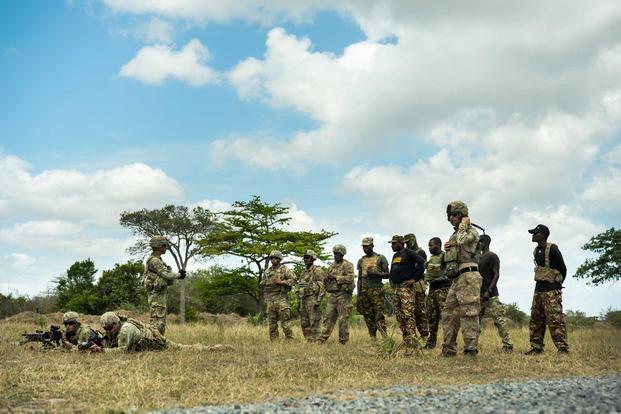A Pentagon review has confirmed an earlier U.S. Africa Command investigation that there was "no single point of failure" or any criminal negligence amid a 2020 al-Shabaab attack on a Kenya base that killed a U.S. service member and two contractors.
But the U.S. base and an adjacent airfield were more vulnerable due to a culture of complacency among forces deployed there, and several troops -- both enlisted and senior officers -- were punished through "performance evaluations, decorations, unfavorable information files, and control rosters," the Air Force said Thursday.
"These actions can affect the individual's career in terms of promotion eligibility, reenlistment, and assignments," according to an Air Force statement released along with the Pentagon findings. "For the officers who were identified, regardless of the action taken, the findings of the investigation will be documented in their Officer Selection Record."
Read Next: Army Won't Commit to April Rollout of Troubled Fitness Test
The service said it would not release the names of those punished due to privacy concerns.
Overall, a review of the initial investigation by Africa Command into the Jan. 2, 2020, attack at Manda Bay, Kenya, by Army Gen. Paul Funk agreed that there was no criminal negligence or misconduct by U.S. personnel who were stationed at the naval base with Kenyan forces.
"I concurred that the proximate cause of the death of three U.S. citizens, injuries to three other U.S. citizens, and the loss of U.S. aircraft and property was the attack by a masked force of determined, disciplined and well-resourced al-Shabaab fighters," said Funk, who is head of the Army's Training and Doctrine Command.
Funk briefed reporters at the Pentagon about the review's findings.
"No single point of failure directly caused the loss of life and damage to the property at Manda Bay," he said. "My review found that neither criminal negligence nor misconduct by any U.S. personnel was the proximate cause of loss of life or property at cooperative security location Manda Bay."
Defense Secretary Lloyd Austin accepted the review conclusions, effectively shutting the book on the stunning attack that killed Army Spc. Henry "Mitch" Mayfield Jr., 23, of Hazel Crest, Illinois; and two contractor pilots, Dustin Harrison, 47, and Bruce Triplett, 64.
Austin ordered the review last year to "ensure the department had a complete look at the causes of the attack," Funk said.
Funk's review agreed with Africa Command that the disastrous attack was made worse by a lack of focus on force protection; inadequate understanding of the threat from the terror group; inadequate preparation by security forces; and poor mission command at the tactical level.
The incident has led to new training requirements for all troops who deploy to Africa, where the U.S. is working with countries like Kenya and Somalia to root out extremist groups and militias.
About 30-40 al-Shabaab fighters launched mortars at the U.S. Camp Simba before attacking an airfield at Manda Bay, in what the Pentagon deemed a complex attack. The Africa terror group is the largest affiliate of al-Qaida, which was responsible for the Sept. 11, 2001, attacks.
Mayfield and another service member were clearing the landing strip in the morning and saw the heat signatures of fighters hiding in the bush but mistook them for hyenas, according to Lt. Gen. Steven Basham, deputy commander of U.S. Air Forces in Europe-Air Forces Africa, who participated in the Funk review.
The fighters launched rocket-propelled grenades at the airfield, first hitting the men's vehicle and then the aircraft being flown by Harrison and Triplett, Basham said.
"The first RPG penetrated the front windshield but did not explode," he said. "The second RPG penetrated the driving side door and a moment later this device detonated, killing Spc. Mayfield instantly."
-- Travis Tritten can be reached at travis.tritten@military.com. Follow him on Twitter @Travis_Tritten.
Related: US Service Member, DoD Contractors Killed in Kenya al-Shabaab Attack












